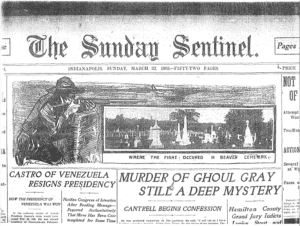Grave Robbing in Fishers- Part 1
By: David Heighway, Hamilton County Historian
Grave robbing, the subject of countless horror movies, was a real-life concern for late-19th century Hoosiers. As in the movies, the object of the crime was not any valuable object that may have been in the grave, but rather the bodies themselves. Also called body snatching or resurrection, this was often the only method for medical schools to obtain subjects for teaching their students. It was finally ended only after lurid criminal trials forced the state government to take direct action. Around 1900, some residents of the town of Fishers became notorious for their involvement in the crimes.
 The first person, Wade Hampton “Hamp” West, was born in 1844 in North Carolina. Later in life, he said that he had enlisted in the North Carolina Infantry during the Civil War and participated in the battles of Chancellorsville, Pickett’s charge at Gettysburg, and the Crater at Petersburg. At Chancellorsville, supposedly, his unit was the one that accidentally shot Stonewall Jackson, which would mean it was the 18th North Carolina Infantry. He also said that he had been wounded when a shell fragment tore away his cheekbone and that he deserted the army rather than surrender at the end of the war. Whatever the reason for leaving North Carolina, after the war he took his wife and moved first to Henry County, Indiana, and then to Hamilton County around 1880. One of his first acts after arriving in Hamilton County was to kill a man in tavern brawl in the town of Fishers, or “Mudsock” as it was then called. Since Fishers was a very rough place at that time, the court acquitted him based on his plea of self-defense.[i] This attitude must have appealed to West for he chose to settle here and at various times farmed and operated a tavern.
The first person, Wade Hampton “Hamp” West, was born in 1844 in North Carolina. Later in life, he said that he had enlisted in the North Carolina Infantry during the Civil War and participated in the battles of Chancellorsville, Pickett’s charge at Gettysburg, and the Crater at Petersburg. At Chancellorsville, supposedly, his unit was the one that accidentally shot Stonewall Jackson, which would mean it was the 18th North Carolina Infantry. He also said that he had been wounded when a shell fragment tore away his cheekbone and that he deserted the army rather than surrender at the end of the war. Whatever the reason for leaving North Carolina, after the war he took his wife and moved first to Henry County, Indiana, and then to Hamilton County around 1880. One of his first acts after arriving in Hamilton County was to kill a man in tavern brawl in the town of Fishers, or “Mudsock” as it was then called. Since Fishers was a very rough place at that time, the court acquitted him based on his plea of self-defense.[i] This attitude must have appealed to West for he chose to settle here and at various times farmed and operated a tavern.
West apparently had other ways that he earned money as well. When a man named Rufus Cantrell was arrested in September of 1902 for grave robbing, he pointed out West as one of his main competitors. West denied everything, but was arrested on November 14.[ii]
In March of 1903, West was indicted by a grand jury. During the testimony for this, one of the many bizarre stories of this affair came to light. Cantrell had contended that during one of his nightly expeditions, he and his gang had just finished excavating a grave when Hamp West and his gang arrived. West ordered Cantrell away from the grave, and Cantrell refused. A brawl ensued, and suddenly both gangs drew pistols and began firing. A member of Cantrell’s gang dropped into the open grave with a bullet through his neck, while Cantrell and the rest of his men fled into the night. At the trial, Cantrell accused West of either burying the fresh corpse in a swamp or selling it to the medical schools. West denied that the incident had even occurred.[iii]
Hamp West’s trial began In Noblesville on July 2, 1903. It seemed almost anti-climactic after the trials of some of the other grave robbers. However, there were some surprises. One of the last witnesses produced by the prosecution was a neighbor of West’s from Fishers. The young man testified that while walking through a patch of woods on his land he accidentally came upon West boiling something in a large kettle. It turned out to be “the body of a rather low, heavy-set man with the head missing”. The young man did not say how this encounter finished, but the court did not admit his testimony as evidence, because it was ruled as not material to the case at hand. However, West was found guilty on July 16 and sentenced to ten years at Michigan City Penitentiary.[iv] West died of stomach cancer in prison in 1904.[v] and became a part of the folklore of the Fishers area.[vi]
[i] Noblesville Ledger, August 30, 1904, p.1.
[ii] Indianapolis Sentinel, November 14, 1902
[iii] The Sunday Sentinel, March 22, 1903, p.1
[iv] Noblesville Ledger, July 17, 1903, p.1
[v] Ledger, August 30, 1904, p.1
[vi] Hamp West, Grave Robber compiled by William T. Myers, Noblesville, Ind., 1981.
